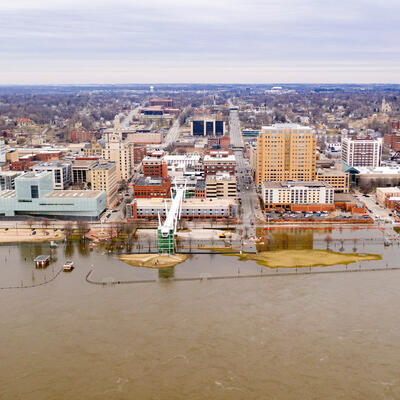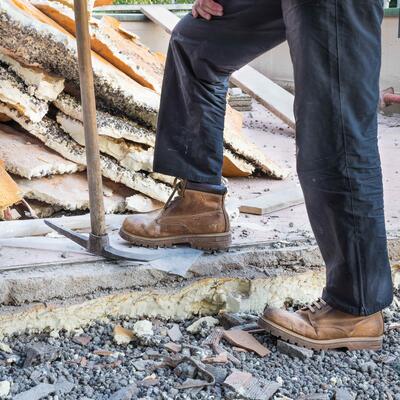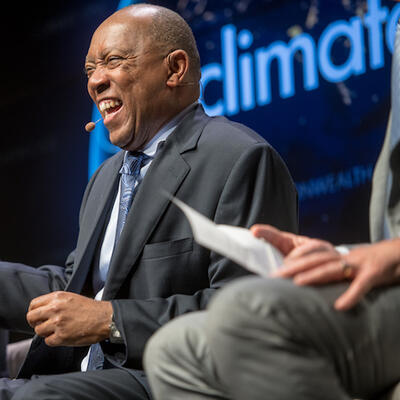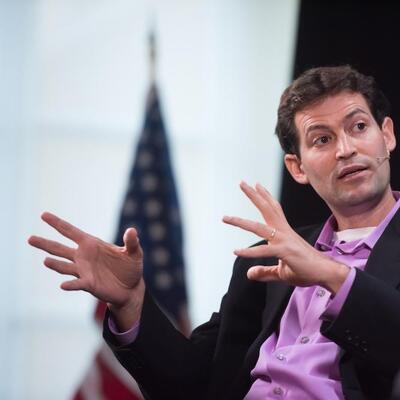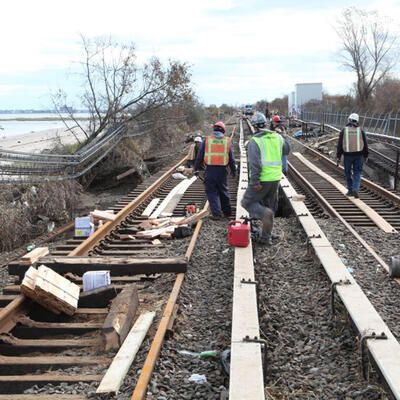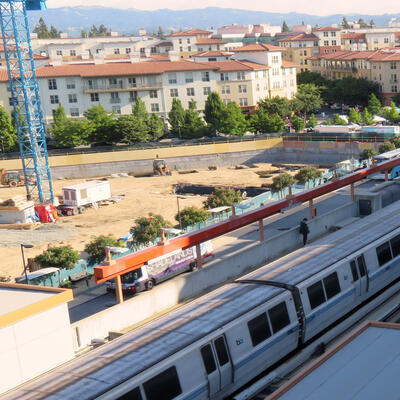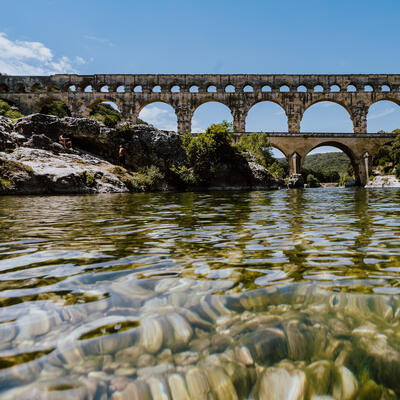
Water and Civilization: Resilience and Collapse
Guests

Giulio Boccaletti

Sara Aminzadeh
Summary
Water is essential for life, and throughout human history we have sought to control and make use of it. As Giulio Boccaletti explores in his new book, Water: A Biography, that relationship with water has underpinned human civilization, forming an integral part of society, government and land use systems. But despite humanity’s accomplishments in “replumbing the planet,” we remain at its mercy, whether we think so or not, Boccaletti says.
“Today we operate under the illusion that water on the planet is nothing more than a backdrop to human events. Humans create systems to control water, forget its power, and then relearn it again when their systems fail. The cycle repeats,” he writes.
Until the last 60 or 70 years, he explains, most people encountered water and its variability on a daily basis, “and therefore adopted strategies to be resilient.”
Throughout his book, Boccaletti offers many different stories of the rise and fall of civilizations across the globe, and how some of that drama is tied to our dependence on water and climate. He says it’s important not to be overly deterministic about that connection, however, even in our modern era:
“You hear in the news the story of how droughts have exacerbated conflicts and have driven people to war, etc. But dictators have a big responsibility in the collapse of their states. [President Bashar al-]Assad bears a lot of responsibility for what happened in Syria. We can't say it was water scarcity that created the crisis,” he says. “But it’s certainly the case that in a vulnerable or fragile state, environmental stresses, particularly for agrarian societies, become very powerful stresses.”
We’re seeing some of those stresses this year. Climate disruption is making floods and droughts more severe, creating water whiplash between too much and too little.
Hurricane Ida killed more than 50 people, many of them drowning in cars or basements, and more than half a million people were without power more than a week after it hit. We’ve seen the first official cuts in the Colorado River supply after Lakes Mead and Powell dropped to historic lows. Arizona will see its Colorado River supply cut by 30% next year, and yet Phoenix just overtook Philadelphia as the fifth most populous city in the nation due to booming population growth.
But access to water has never been equal or entirely fair, despite its essential nature.
Sara Aminzadeh is vice president of partnerships at the U.S. Water Alliance, a group of public and private water entities. Her organization works to help communities access water and adapt to climate change, including advocating for necessary investment in water infrastructure.
“The essential guidance for water utilities I think anywhere in the country to adapt to our climate reality and our climate future is really a diverse portfolio approach: so, not relying on any one supply too heavily,” she says. And there are essential environmental justice considerations to keep in mind, including ensuring water access for low-income communities regardless of whether they can pay for it or not, Aminzadeh says.
Her group is optimistic about the Biden administration’s infrastructure bill, which promises to make the largest investment in clean drinking water and wastewater infrastructure in American history.
“From my perspective, the funding that will become available through the water infrastructure package should be prioritized for communities who need it most,” she says.
Related Links:
Full Transcript
Greg Dalton: This is Climate One. I’m Greg Dalton. Many modern humans have lost connection with the essence of life: water.
Guilio Boccaletti: In the last 60-70 years, not more than that people have sort of been living under this illusion that water comes out of the tap, that's its origin, and that you know it's perfectly normal to leave your home and not have to wade a stream, right. That hasn’t been true for 10,000 years. Most people most of the time encountered water and its variability on a daily basis and therefore adopted strategies to be resilient.
Greg Dalton: How can we rethink our relationship with water and build resilience into our systems as we experience increased climate disruption?
Sara Aminzadeh: For a long-time water was sort of unseen and not thought about. You know everyone uses water of course, but it wasn't thought of as something that we needed to prioritize and elevate and talk about and think about. And so, the One Water Movement seeks to change that.
Greg Dalton: Learning from our water history. Up next on Climate One.
Greg Dalton: What can the past teach us about living with water? Climate One’s empowering conversations connect all aspects of the climate emergency. I’m Greg Dalton. As the Glasgow climate summit approaches, we are taking a look at what’s on the agenda, and who’s at the table. There’s a growing push among environmentalists to “decolonize” climate negotiations such as COP26. Such groups say western countries’ monopoly over the climate agenda smacks of colonial hangover and will force those least responsible for the climate crisis to pay the costs of it first. Climate One correspondent Aman Azhar explains.
Aman Azhar: Who is responsible for the climate crisis? And who owns the climate debate? Do people from the global South have a say in setting the climate agenda? Grassroots activist groups are planning to make these questions front and center at this year’s COP26.
Basav Sen: More than half of the world's population lives in developing countries, in the global south. They have been responsible for far less of greenhouse gas emissions than wealthy northern countries. So, the countries who disproportionately caused the problem of climate change to begin with, should not dominate the discourse.
Aman Azhar: That’s Basav Sen, director of Climate policy Program at the Institute of Policy Studies. He says unless the industrialized countries disinvest from their fossil fuel-based economies and start treating developing countries as partners, the demand for ‘decolonizing’ climate summits such as COP will only grow louder. Because developing countries are most likely to bear the brunt of climate inaction sooner, and suffer more because of it.
Basav Sen: The realization that the COP needs to be decolonized has certainly sunk in with grassroots social justice movements worldwide. But obviously, much more needs to be done in terms of pressure from the grassroots, for governments in the global south to really assert their rights, and for governments in the north to realize that they need to accede to the very justifiable demands from the global south.
Aman Azhar: Sen says that even the choice of venue for a global climate summit like COP--often hosted by European nations--can be a first step in creating a meaningful engagement across the North-South divide.
Basav Sen: The choice of venue sends a political message, because the host country for the COP has a role in determining the agenda, in determining the entire atmosphere in which the talks happen. If a country that is severely impacted by climate change in Africa or in the Pacific were to host a COP. That would be a very different environment for the negotiations than if it were to happen in one of the wealthy countries.
Aman Azhar: Gregory Jenkins, a professor in the department of meteorology at the Penn State University, says overcoming the North-South divide on climate action will be difficult, and will take the efforts of many.
Gregory Jenkins: It would be a real miracle if it could be decolonized because I really think about all the things that need to be done on the ground, and the discussions that need to happen at the National, regional, and local levels. And people have to organize at that scale, to do something that is meaningful to offset this climate crisis.
Aman Azhar: Jenkins says the concerns of the developing world and disenfranchised are not high enough on the COP agenda.
Gregory Jenkins: There would have to be sessions that address the inequity that is currently occurring on the planet, as it relates to social injustice, or environmental degradation that are impacting people from a day to day basis. Or the impacts, the floods, the heat stress, the heat waves that are impacting so many people around the globe. That would have to be an open conversation with policymakers listening, and not necessarily dictating what's next.
Aman Azhar: Basav Sen says the COP leadership of industrialized nations is aware of this push for inclusivity from the grassroots climate movement. But it’s less clear whether they are prepared to recalibrate the present North-South imbalance that colors climate talks.
Basav Sen: They likely know what they're doing, but they are in some sort of denial about it because it's not politically convenient for them. But the realization certainly exists on the part of grassroots people's movements. And we will certainly not hesitate to voice those demands in the most assertive way possible.
Aman Azhar: As the conference in Glasgow draws nearer, environmental and rights groups are getting ready for worldwide rallies to push world leaders to decolonize the climate debate -- along with decarbonizing the global economy -- before it’s too late. For Climate One in Washington D.C., this is Aman Azhar
Greg Dalton: Our focus today is water: it’s essential for life, and throughout human history we have sought to control and make use of it. As Giulio [ju-lio] Boccaletti explores in his new book, Water: A Biography, the distribution and control of water has underpinned human civilization, forming an integral part of society, government and land use systems. Climate One’s Ariana Brocious spoke with Boccaletti about the lessons from history that matter today.
Ariana Brocious: So, I'd like to start by asking you about the fact that flood origin stories are common across a lot of cultures. I found this really fascinating in your book. Can you tell me more about that?
Giulio Boccaletti: Sure. It turns out that most societies have water somewhere at the hearts of their origin. And in the British Museum there’s a very famous cuneiform tablet that was found in the royal library of Ashurbanipal in Nineveh, the modern-day Iraq it was found in the 1870s. And what’s remarkable about that tablet is that it tells the story of a man who's told by god to build a boat and put all the animals on it and then escape a massive flood and float for days and days and days and nights, nights, nights until he sends off a dove to find land and eventually the dove comes back and then he lands on this mountain and the dove stayed with him and the flood passes and life begins again. Now, that story was of course you know those of us who know the biblical texts the Abrahamic religions will recognize it as the story of Noah. In fact, predates the writing of the Bible by about 1000 years and it’s the story of Utnapishtim in the Epic of Gilgamesh. And it turns out that there’s quite a lot of literature wondering whether there was in fact an event that all these civilizations are remembering. I think my conclusion from reviewing the literature is that it’s probably not a single event, but it's true that all societies have this memory of wrestling with water. Same story, right, over and over and over again. Everywhere you go you find the story. And so, what’s going on? Well, turns out that the planets were last glaciated about 20,000 years ago, right. And then after 20,000 years ago ice started to melt. Now, we, society in general, we have complex societies around 5,000 years BCE, right, so 7,000 years ago. So sometime between 20,000 years ago the last glacier maximum and 7,000 years ago when the large complex societies rise, some time in that moment we became sedentary whilst the world around us was changing, you know, was deglaciating. And that really is the root of the story.
Ariana Brocious: Yeah. Well, so obviously as civilizations did develop, they became somewhat more complex, and thus their ability to control and manage water grew. So, I’m wondering about some of the more dramatic cases maybe of this controlling, efforts to control water in some of the earlier history that you came across.
Giulio Boccaletti: Well, the drama in truth comes with the failures to control, right. So, the sort of control is one that sort of gets more complicated, you know, essentially societies are able to produce surplus and with surplus you can feed administrators and you can feed an army. And we now have to be careful, Ariana, not to be overly deterministic about the story, right. It’s that the distribution of water caused the rise of these societies but of course as they developed, this relationship with water shaped their journey. Drama comes in when these solutions fail, right. And one of the most important ones even for us today because I think it's an archetype of the situation the predicament, we find ourselves in is the failures that happens at the end of the Bronze Age. So, we’re talking about the 12, 13th century before common era. When you had essentially around the Mediterranean a fairly sophisticated system of regional trade. People would have heard of the Hittites and the Egyptians and the Mycenaeans. And it was a fairly integrated global system in a way it was globalization for the Bronze Age. And we have remarkable you know palaces and great surplus and wealth and people traded from Scandinavia all the way to the Black Sea, right. And then the climate changed. And we know that from some independent palaeoclimatological records. And what happened then as has happened many times since, is that the most important, the most salient changes were not necessary the biggest physical changes. But the changes that happen to the most vulnerable people. That's where really the crisis and the kind of ultimately, the collapse happens. In this case, pastoralists that lived in the Northern Balkans were particularly hit hard by a dryer colder Mediterranean; they started moving southward. And that migration southwards, which then became known as the migration of the Sea People was then responsible or probably responsible for the cataclysmic collapse of the Hittite Empire for the complete disappearance of Hugaret, for the destruction of Jericho for you know the invasion of Egypt and so forth so on. So that's an example of a pre-dramatic events in the story of water.
Ariana Brocious: Right. Well so, climate, yes, as you mentioned has changed and caused a lot of ramifications over the course of our human history. So, specifically you write about ancient Egypt and I'm wondering if you can describe how you think climate factored into the fall of ancient Egypt.
Giulio Boccaletti: First I should say the Egyptian state in some form or another was the ancient Egyptian Kingdom. The three kingdoms were around for the better part of 3000 years and ultimately was invaded by Octavian, right. So, narrowly speaking what caused it was they were invaded by somebody else. That said, there's no question, I mean, Herodotus described Egypt as the gift of the Nile and indeed it was, right. I mean it’s sort of remarkable that this land, which is in the Nile valley just below the cataracts, which is fed by waters that come from Lake Victoria and the Blue Nile on the Ethiopian mountains is incredibly rich, right. To the point that this narrow strip that runs along the desert you know at the time at the height of the middle kingdom was capable of feeding probably a third of the world’s population, right. I mean it was incredible productive capacity, right. And so, it’s not surprising that Egypt was this extraordinary magnet for immigration this sort of extraordinary beacon of wealth in the Mediterranean and beyond. And Egypt was susceptible to changes in the flow of the Nile but of course one of the things that’s interesting about the Egyptian story is that they were some of the first to build really sophisticated institutions to overcome the variability of the flow of the Nile. Occasionally would fail, right, occasionally they wouldn’t be able to store enough water enough food to ride periods of scarcity. But all in all, they lasted for longer than any of our civilization, you know, they lasted for 3000 years.
Ariana Brocious: Right. And so, what happened with the climate? What changed there?
Giulio Boccaletti: Well, you know, there have been changes all through those 3000 years. Towards the end of the period we’re now talking about when, for example, Cleopatra was around; this is Cleopatra of Caesar, Roman times. There appear to have been significant reductions in Nile flow, which then had an impact on the crop production which then created social strain. And, you know, with the surplus of crops you pay for military, you maintain administration so when you have less of that your things will fall out of control. But again, it’s important to highlight the sort of role that these environmental stresses have on an already vulnerable society. By that point Egypt was already diminished, right. And the reason I emphasize this over and over again is because we tell the same story about the modern Arab spring or about the Syrian crisis, right. You hear in the news the story of how droughts have exacerbated conflicts and have driven people to war, etc. etc. Dictators have a big responsibility in the collapse of their states. Assad bears a lot of responsibility on what happened in Syria. We can't say it was water scarcity that created the crisis. But it’s certainly the case that in a vulnerable or fragile state, then you know environmental stresses particularly for agrarian societies become very powerful stresses.
Ariana Brocious: Do you think we have those same vulnerabilities today?
Giulio Boccaletti: Of course, we do. Well it depends who “We” is. “We” in the US or “we” in the UK don’t necessarily because of course we have the resources to withstand the variability of nature, we can come back to that. Incidentally, you know, the United States, the Mississippi basin is the modern-day equivalent of the Nile, right. The Mississippi basin is the most productive landscape on the planet. It could support 3 to 4 times the population of the United States, right. And there's a lot to be said about what that does to the capacity and wealth of the nation. But there are plenty of parts of the world where that vulnerability is real today. I mean, I worked for a number of years in Ethiopia. There was a time when you could track the GDP growth of Ethiopia with rainfall, right. If you don't have infrastructure, if you don't have ways of capturing water when it comes down and releasing it when you don’t have any then you are at the mercy of what comes down from the sky and there are many least developed countries in the world that are in that predicament.
Ariana Brocious: Right. So, in a chapter on Rome’s water market you describe the transport of grain and how it was essentially the transport of water. And that pattern continues today of course, for example, Saudi Arabia has depleted a lot of its own groundwater and there are companies now buying up vast tracts of Arizona desert to grow alfalfa to export to feed dairy cows in Saudi Arabia that's grown obviously with Arizona water. So, what do you make of that?
Giulio Boccaletti: Well, in some ways it’s not surprising. Trade can be an effective way of optimizing the allocation of resources. And so, trade in general is you know is way in which the whole Middle East survives. If you think about the United Emirates, you know, the carrying capacity of the UAE is maybe 20,000, 30,000 people. But 10 million people live there. And the reason is they import food from all over the place because it can’t be grown there with the amount of water that they have. And, you know, they’re essentially living off somebody else’s water, right. And that’s what the Romans did and that's what they do today. So, it’s not surprising that it happens but because food is a heavily distorted market in many ways, right, partly for good reason, because we need people to be able to afford food. So, cheap food is not a bad thing certainly for much of the world, right, if food fully reflected the cost of producing it lots of people would go hungry, right. But because of those distortions you end up with distortions also in the water space. And so, for example, you end up with these situations where the full cost of using water from deep down in the aquifers below Arizona is not really borne by the farmers and the products that then get sold. And so, you have this, you know, it’s subsidized production, which on the one hand you know may be good for the farmers but on the other hand, for the collective vulnerability to scarcity is a problem.
Ariana Brocious: So, you write that modern water infrastructure has replumbed the planet and the story of water is not technological, it’s political. Humans have organized society around water for their own mutual benefit. So, one example I was curious to have you explain further, is how the early water history of the United States actually set the stage for our Constitution.
Giulio Boccaletti: Yeah. Well, that’s an extraordinary story and I should also say that in many ways the story of water in the United States became the archetype water story for the 20th century. So, in a way the world looks like it does because of the way in which the United States developed its water resources. The origin of that story is indeed around the time of the Constitution. It's an interesting story, right, because America sort of grew by accretion, right. And one of the first moments in which this becomes apparent is, you know, immediately after the Revolutionary War then, you know, states of the independent, newly independent states were tied together by the Articles of Confederation had also inherited essentially the Ohio Valley on the other side of the Appalachians, right. And George Washington, who is a remarkably astute investor, not just a great commander, had an interest in the Potomac because he had acquired lands on the other side of the Appalachians in Ohio quite a lot of land actually. And the problem was that the Spanish owned New Orleans at the time. And so, you know the only way to extract production from the Ohio Valley was to bring it eastward. And in order to bring it eastward you need some fluvial transport bringing it by road would have been completely uneconomical, right. And so, the question was, could we build a canal, an artificial canal that would allow through locks and the likes to pass the mountains, get on their side and then bring back the crop production. So, you know, Washington has this bright idea and then he has of course a problem which is that the Potomac goes through several states. And so, he had this issue of, well, if each of us is gonna tax the passage of these goods as they move from the Ohio Valley to the eastern seaboard, we’re gonna make the production completely uneconomical. And so, we need some mechanism to negotiate how we’re gonna be taxing together, how we’re gonna run this interstate commerce, right? And so, he convened a meeting at his state of Mount Vernon and it becomes a compact which essentially a commercial agreement on the fluvial infrastructure. Now it turns out James Madison was observing this with an interest so goes the story and inspired by the success of getting through three or four states to agree on a regime a trade regime for the Potomac. He then said, well, let's try and replicate that with all of the states in Annapolis. So, he convenes a meeting in Annapolis, it was successful enough that they concluded that they needed an actual convention. And so, that's what they ended up doing in Philadelphia, the Philadelphia Convention of course which by that point had become a constitutional convention. And actually, I don’t wanna overstate the case, right, this is not obviously just about the trade between states. But it is sort of interesting that essentially the problem was you have these independent states there’s a set of, you know, Articles of Confederation, which was essentially a monument to libertarianism. So, they have no mechanism, there was no federal infrastructure to speak of, right, you need consensus and everything. And what they recognized was they needed an institutional architecture to manage this problem of commerce across rivers if these 13 states we’re gonna ask to work together and take advantage of the vast landscape that sat to the west of them. And so, they ended up with of course, you know, you’re American obviously I’m not as you can tell from my accent but, you know, you ended up with the American Constitution. But if you go and read the debates during the convention this issue of the compact comes up over and over again. And people point to it as an example of why and how you can still work together as states.
Greg Dalton: You’re listening to a conversation between Climate One’s Ariana Brocious and Guilio Boccaletti, author of Water, A Biography. Our podcasts typically contain extra content beyond what’s heard on the radio. If you missed a previous episode, or want to hear more of Climate One’s empowering conversations, subscribe to our podcast on your favorite app. Coming up, will our current water structures survive a changing climate?
Giulio Boccaletti: We're in a situation where barring some surprise, you know the Western United States has to confront these questions. The good news is there’s many answers, the bad news is, somebody will bear some significant costs and whether those costs will be borne fairly, that's really the question, and it's an entirely political, entirely human question.
Greg Dalton: That’s up next, when Climate One continues.
Greg Dalton: This is Climate One. I’m Greg Dalton, and we’re talking about the hubris of controlling water with author Guilio Boccaletti. Let’s rejoin his conversation with Climate One’s Ariana Brocious.
Ariana Brocious: The American West represents a good example of our hubris to control water for civilization. There's a story of John Wesley Powell, who traveled through, one of the first people to travel through what's now the West and he came back saying that the development of that territory would be hindered by water supply and that we should be planning accordingly. So, can you explain this path that the United States took, you write the United States had set itself up to become the most radical architect of water geography in human history. Give us a sense of sort of how significant that was and how it differed from what happened in maybe other parts of the world.
Giulio Boccaletti: Well, it's interesting I mean a lot of points to come back to but just to say that in the end it didn’t differ that much because most people ended up copying the United States, right. So, that's kind of an interesting story in itself. But to me the expansion of the West is fascinating story and it’s a political story. Again, it shows why this is fundamentally a political issue, right? So, the Western expansion one can debate this kind of underlying politics you know and how colonial it was or wasn't. Fact of the matter is that once the United States acquired all these lands all the way to the Pacific coast it had been this fundamental political problem of representing those states in the federal system. And in order to represent the states in the federal system we need people who live there and those people need to have political agency. Hence the need to move people right and so you end up with these successive ways of attempts at settling. It was an arid climate as there are others on the planet and it was simply impossible to do without federal underwriting of large scale infrastructure. Now, today we judge that infrastructure with the eyes of the 21st century and we judge it for its failures. But we shouldn’t forget that it was an extraordinary success for the politics of the time and for the objectives of the time. People moved to the West in droves. The West was able to successfully support you know an exponential growth in the population. And all of this was in the back of the building of this large infrastructure. And to give you a sense of scale when this process started, so in 1904, the largest dam in the world was the lower Aswan High Dam on the Nile and had been built by the Brits during the protectorate in Egypt, right, it was made of bricks. We essentially, at the beginning of the century, captured nothing of what came down from the sky anywhere in the world. Then starts the buildout of the United States West. By the time that runs its course in the 1960s and 70s the world catches a fifth of anything that comes down from the sky, right. That's the replumbing of the planet and that starts when the federal government decides that it’s gonna build Hoover Dam and then Fort Peck and then Bonneville and all this infrastructure that captures water. And today we of course we judge it harshly and by the way it appears to be insufficient and possibly failing, right.
Ariana Brocious: Yeah, we’ll get into that.
Giulio Boccaletti: Yeah, exactly. So, the solution that was good then may not be good now but it was an extraordinary transformation of a very large part of the planet in a way that had never been seen.
Ariana Brocious: Yeah, and I think for anyone who has been to Hoover Dam or some of these things even today, looking at the scale of the concrete and imagining building them with like early 19th century tools it is really staggering. Of course, we do want to acknowledge that when the West was expanding there were already people here, lots of indigenous people whose land was taken and the people being enfranchised were white settlers.
Giulio Boccaletti: White male settlers as a matter of fact.
Ariana Brocious: Correct. Yes. So, along with this in this early part of the century early 19th century, dam building, I'd like to talk about the Tennessee Valley Authority because getting into hydropower and what sort of remarkable transformation occurred there again with this federal backing of a project, that it sought to accomplish a lot of things at once. Can you explain that?
Giulio Boccaletti: Yeah, I mean the Tennessee Valley Authority is just a remarkable story of both hubris and hope in a way and it had enormous impact, right. And if you read what people at the time wrote about it, it was a really hopeful time, right. And interestingly it has resonance with some of the arguments that people make today, you know, follow the science, you know, plan for the future. It was a positivist attempt at essentially scientific management of the environment, except that with the science of the 1930s, right. So, what happened was this, by the time Roosevelt gets into office. Most people living in cities have access to electricity, but people living in rural areas largely did not. And one of the problems was that because transporting electricity long distance was impossible. The cost that the people in the rural areas faced to get electricity was extremely high and it was set by private companies who effectively had a monopoly, right. Now, remember that at this time, the largest and most scalable technology for the production of power was hydropower, you know, the big thermal power plants that we kind of came to rely on came later in the 1950s and later. So, this time you have hydropower as the principal power technology and you didn't have much transmission which meant that rivers were the blueprints for everything for industrialization for power production, energy production, right? Now, the Tennessee Valley was the poorest part of United States one of the poorest parts in the United States. And Roosevelt comes in and he has this vision of creating four great utilities, one in each corner of the country, starting with the Tennessee and then the St. Lawrence and then Colorado and then the Columbia River to essentially create federally subsidized power that would set a benchmark of what the price should be for electricity. Starts with the Tennessee, the Tennessee Valley gets created and it gets created on the principles of scientific management. So, the issue wasn't just creating hydropower it was protecting people from floods. It was actually interestingly reforesting the basin. The basin was completely degraded and so there’s a lot of conservation. And so, the Tennessee Valley Authority becomes this huge development project which has essentially Roosevelt described it as with having the authority and power of the public sector, but cloaked with the tools of a private corporation. And it was at some level incredibly successful, you know, if you look at the all development indicators in the Tennessee Valley they shot up, there's no question that the regional investment had enormous impact. Now, there was however a problem which is it was an extraordinary display of executive power, the TVA could exercise eminent domain. They were essentially the manager of the landscape. People started noticing this is a massive overreach of executive power. And you know Roosevelt was never able to replicate the TVA anywhere else in the United States. But the kind of conclusion of the story which is kind of interesting is whilst the TVA was not replicated at home. It was amply replicated abroad when Truman came in, he then created this thing called the four-point strategy which is essentially a strategy of internationalization of the technical knowledge of the United States. And so, the world is strewn with Valley authorities. So, it’s a really important story for better or worse. I mean it’s, you know, it’s the way in which the American ideals of modernization replumbed the planet.
Ariana Brocious: Right. Right. Yeah, and I wanna move to one of the other river systems you mentioned that’s of, you know, a special focus today which is the Colorado. Obviously, this year we've seen the Colorado River reservoir decline to historic lows, which is threatening agriculture and hydropower and there seems to be, Arizona has already taken a significant cut or well, starting next year more may be imminent. Are we reaching the limits of some of these human systems maybe in the American West?
Giulio Boccaletti: Yes, I mean some would argue we already passed them. I mean in some ways what’s happening now is not terribly surprising to anybody who's looked at the situation in the basin. I mean there was a study on the supply and demand in the Colorado Basin from five or six years ago that showed that we’re already past the point of which demand intersected to the ability to supply. Now, there is some fuzziness in these numbers and so you can sort of operate for a while on a hope and a whim but the reality is, we have far exceeded the capacity of the basin. Now, the thing that's important here though is that and that’s why again I come back to this point which is the story of water is a political story. Really, the fundamental debate is not about, you know, do we have enough dams, do we have enough reservoirs but really is what we do with water. What vision of society do we have because that’s not fixed right that's susceptible to our decisions as citizens? So, one of the things that irritates me to no end is that we end up you know, having conversation about water that frame the problem is consumers. This is not a consumer problem, this is a citizenship problem. What do you want your home to look like because once you've decided that almost everything follows? If you decide that your arid landscape needs to have verdant hills well then that tells you something about what kind of water supply you're gonna need. That’s not, you know, it’s not necessary, certainly it’s a choice. And it’s by the way a viable choice but one that has enormous costs. So, I think we're in a situation where barring some surprise you know the West of the United States has to confront these questions. The good news is there’s many answers, the bad news is, somebody will bear some significant costs and whether those costs will be borne fairly, that's really the question, and it's an entirely political, entirely human question.
Ariana Brocious: You write that water is the ultimate public good, a moving formless substance that defies private ownership is hard to contain and requires collective management. But yet we’re seeing private markets at work in the water world today and in some places, they’re actually reshaping who owns water, who controls water to a large degree. Does that worry you?
Giulio Boccaletti: Well, yes and no. I mean I think that you know water can't be owned but what those markets are trading is not actually really water is access and that's a slightly different thing. It sounds almost the same, but it’s completely different because you don’t actually own the molecule. What you own is access to water for some time while you use it for whatever it is that you’re using it. And then the water actually evaporates and goes somewhere else. Sometimes the framing of markets is deceptive because people get in the heads that we’re talking about something like oil markets. But water, it evaporates it comes back down; the amount of water on the planet has been fixed ever since it appeared aside from some small electrolysis. So, it's not quite the same story as others sort of, you know, nonrenewable resources. So, am I concerned that there is a market for access? Yes and no. No, because in principle markets have to be regulated. The markets exist because somebody regulates them. You know it’s an illusion to think that markets is just the sort of the self-expression of a free for all. If you don’t have legal recourse if you can’t sue people when they do a tort if you can't, nothing works, right. So, you need the implicit underwriting or a sovereign to make a market work right. And they can be extraordinarily effective at allocating resources because they can be extraordinarily effective at allocating information, right. It’s harder for a central planner to know what goes on than it is for people operating the market. Now with that said, however, one of the big problems just because you are trading effectively, not quite but effectively, trading access, not the stuff what you're really trading on is access that's delivered by the infrastructure that was paid by somebody. And the markets don't actually the price that typically comes out in these markets doesn’t actually pay for the infrastructure. And so, I’m worried if people think that markets are gonna be the silver bullets to allocating resources efficiently, right. And then secondary problem which theoretically is a huge problem in practice it depends is this issue of the creation of monopolies. Markets tend to create monopolies and so there's a risk that somebody starts acquiring more and more water. In truth, I worry less about that in a place like the United States where there is a very sort of vibrant political infrastructure than I do in a place like say Chile or in other countries where there are trading systems, but the power of the citizens is far diminished, compared to the power of the corporation.
Ariana Brocious: So, as we get toward the end here I want to kind of come back to some of the central themes of your book which have to do with this idea that humans have created somewhat of an illusion for ourselves that water is not a force to, you know, that kind of forms as you write I think a backdrop to human events and that we sort of put it aside, we control it. But then we learn the lesson over and over again when these systems fail that it is an incredibly powerful force. So, we've seen really catastrophic floods this year, you know, kind of indicating some possibilities for what climate is gonna be bringing to us. Are the systems we created in this modern world going to be sufficient to serve us in controlling water as the climate becomes more disrupted?
Giulio Boccaletti: Look, the answer is likely no. And the problem is that most people don't realize this. The issue is not so much that we have to wrestle with water. That's been true for 10,000 years and we've managed to create incredible things over the course of the journey, right. So, by itself that’s not a particularly surprising statement. What's odd is that in the last 60, 70 years not more than that people have sort of been living under this illusion that water comes out of the tap that's its origin, and that you know it's perfectly normal to leave your home and not have to wade astream, right. That hasn’t been true for 10,000 years. Most people most of the time encountered water and its variability on a daily basis and therefore adopted strategies to be resilient, right. And therefore, made choices informed by the knowledge of the statistics, right. So, even if it's not raining today you have enough experience to know that it will eventually rain and maybe flood and so you don't build your house on the floodplain because it might get you know you might get the river coming through your living room and moving the piano as Faulkner used to say, right. So, for most of our history that's how we approached this we were humble you know in our sort of dance with the environment. And people should remember, you guys have tragically now seen the impact of Ida in this last couple of weeks. A hurricane like Ida, if you think of it as a thermal engine pretty much cycles through over its lifetime more less the same amount of energy that the entire world economy uses, right. Now, that’s not the energy it uses to do work it’s not just the effect of wind it’s the entire energy cycle of the hurricane. But that just give you the sense of scale that one single system is as powerful as everything that the modern economy has been able to move, all the heating all the power industry, right. So, we’re talking about a planetary force that dwarfs anything we could conceivably do even in the next hundred years. Even if we go to Mars, right. So, we have to realize that we’re gonna have to wrestle with this force and the most worrying thing about it is not that we have that’s the facts of life, but that people don't realize it. And when they don’t realize it they’re not expecting it. And when they don't expect it they don’t plan for it. And when they don't plan for it, catastrophes happen. Water matters and water matters even today even if we all have an iPhone. The boring old technology that’s been around for 10,000 years of catching and conveying water all over the place shapes reality and it still matters.
Ariana Brocious: Giulio Boccaletti is author of Water: A Biography. A really fascinating look at human’s history with water since basically it started. Thank you so much for joining us today on Climate One.
Giulio Boccaletti: Thank you. It was a pleasure.
Greg Dalton: You're listening to a conversation about what history portends for our water future. This is Climate One. Coming up, what the “One Water movement” seeks to accomplish:
Sara Aminzadeh: To really cultivate appreciation for the value of water, to recognize instances where we’re in danger of losing water, to acknowledge and support communities who don't have access to water, and to really advocate for the level of investment in our water infrastructure and in our water community that is really needed.
Greg Dalton: That’s up next, when Climate One continues.
Greg Dalton: This is Climate One. I’m Greg Dalton. We’re talking about stories of water collapse and resilience. Climate disruption is making floods and droughts more severe, creating water whiplash between too much and too little. Hurricane Ida killed more than 50 people, many of them drowning in cars or basements, and more than half a million people were without power more than a week after it hit. On the too little side, we’ve seen the first official cuts in the Colorado River supply after Lakes Mead and Powell dropped to historic lows. Arizona will see its Colorado River supply cut by 30% next year and yet Phoenix just overtook Philadelphia as the fifth most populous city in the nation due to booming population growth. Sara Aminzadeh [aaah min za dah] is vice president of partnerships at the U.S. Water Alliance, a group of public and private water entities. I asked her how serious the current western water stress is and whether people are grasping the gravity of the situation.
Sara Aminzadeh: The water stress is very serious and I think people are grasping the water stress situation. I think what people don't know is quite what to do about it. In other words, if you plan to move to Phoenix or other places in the West. If you live in California you see the wildfires, you see that there are water cuts and shortages, but people don't know how to change what they're doing in their daily life to adapt essentially. And I think that's the gap that we as water nonprofits have to try and fill is to help people understand how to live and how to be sustainable in this current climate.
Greg Dalton: And we come across this in climate conversation. People want to do something, well if I go vegan or you get an electric car that's important, but it’s so big. So, you know, how important is individual conservation? We often hear in California 80% of the water is ag. So, you know, brushing your teeth and shorter showers yeah that's nice, but does it really add up?
Sara Aminzadeh: It does really add up. During the last drought in 2012, we saw a tremendous improvement in our water conservation in communities all across California just by people making those simple personal decisions. You know, stopping watering their lawns, stopping washing their cars. Shorter showers and things, you know, daily decisions really did make a difference. And then on top of that there are deeper cuts and adjustments people can make they can permanently remove thirsty landscaping. They can upgrade their appliances to be more efficient. These things make a difference at a residential level and of course also at a corporate level even more so.
Greg Dalton: A town in Utah has banned future housing developments connected to the municipal water supply because they simply don’t have enough water. How common do you think that will become in the future where just water is not available?
Sara Aminzadeh: I think it could become common. We've seen a similar issue here in my hometown of Marin County where there's a question about whether there is enough water for new housing that’s planned. But you raise a good point about finding a balance between what is the personal sort of burden or impact that people face due to water shortages and what other deeper reforms that we can and need to make in agriculture and in other industrial uses, and other corporate uses as well. And so, I think that's a big place to potentially look.
Greg Dalton: Yeah, one thing that is generally true that when something becomes in shorter supply or less predictable supply prices go up. Are we gonna see water prices go up and how should that be handled because I know one of the missions of your organization is preserving affordability?
Sara Aminzadeh: Yeah, it's a great question. I think you know we saw in the last drought in California that the pricing and budget structures of water utilities did need to change. Many or most of current water utilities are based on a financial model, whether selling water of course which is a disincentive to conservation and efficiency in some ways. And so, we've seen some utilities do some really clever restructuring of their budgets so that we’re not incentivizing you know waterways, especially during times when water is scarce. At the same time as you point out, there are essential environmental justice considerations to keep in mind. We have to ensure the human rights, water for all and that necessitates you know some thoughtful programming around ensuring water access for low income communities no matter whether they can pay or not.
Greg Dalton: Right. And water occupies this unique space and you've written about human rights and climate change. Water is a human right as you noted but it's also a commodity that is bought and sold. So, how do we balance that particularly in a time of stress when certain people can afford water bill increases, but other people we know that climate hits the most vulnerable. So, how do you balance that human right and that commodity aspect of water?
Sara Aminzadeh: I saw some really innovative approaches during the last drought where there was tiered approach, a tiered rate approach where those who are using the most water, we might think about in our minds a really large property with tons of landscaping and very thirsty in general. So, we might think about a pricing approach that charges more once you use more than a certain amount of water per day, but ensures very affordable water for those in the lowest tier who might be in apartment building and are clearly not using a large amount of water. So, there are a lot of innovative pricing structures that we can think about using and that people have used.
Greg Dalton: Sara Aminzadeh is Vice President of Partnerships with the US Water Alliance, a group of public and for-profit water companies. Explain the One Water Movement and what it seeks to accomplish.
Sara Aminzadeh: So, integrated One Water Management is an approach that recognizes that all water has value and that we can manage water in a manner that provides for an essential service while also building strong communities, vibrant economies and healthy environments. So, the One Water Movement is you know what we are seeking to build across the country. We’re looking to continue to cultivate and support a diverse network of community-based organizations, artists, farmers, water utility leaders, neighborhood activists, the private sector, academic institutions. It’s really about thinking about the rich and diverse community of people across the country that are affected by water and water infrastructure which arguably is every single person in the country and can really have a stake in what our water future looks like for our country. And I think for a long-time water was sort of unseen and not thought about you know everyone uses water of course, but it wasn't thought of as something that we needed to prioritize and elevate and talk about and think about. And so, the One Water Movement seeks to change that, you know, to really cultivate appreciation for the value of water to recognize instances where we’re in danger of losing water to acknowledge and support communities who don't have access to water and to really advocate for the level of investment in our water infrastructure and in our water community that is really needed.
Greg Dalton: Right. And climate disrupts that because we’re seeing with climate change the dries get drier and the wets get wetter. So, our water systems are built on this kind of reliable predictable delivery from snow down through mountains and rivers. And we’re seeing epic storms where like weeks of water are coming down in hours or days. So, is the water system gonna be built to accommodate too little and too much?
Sara Aminzadeh: The essential guidance for water utilities I think anywhere in the country to adapt to our climate reality and our climate future is really a diverse portfolio approach so, not relying on any one supply too heavily. And Tucson actually is an example of this. The US Water Alliance is actually awarding the city of Tucson with our One Water prize this year in 2021 for their work to develop a comprehensive program over the past 10 years, reduce their reliance on groundwater and the Colorado River and create a really robust renewable water portfolio. So, you know, the utility invested $2 million in conservation education initiatives. They’re using recycled water to return flow to the river. They passed a green stormwater infrastructure fee. As we’re seeing this Colorado River cuts come through. They are in a solid place and that's really laudable, but it took a lot of time and planning, and it took an investment from the utility and from the community.
Greg Dalton: Right. And I think Los Angeles is also in a pretty good shape after decades of learning lessons of the past and investing a lot of money and putting systems in place. We’re talking about integrating stormwater, freshwater rainwater, etc. Energy is a big part of water as well, often thought of as a separate system. So, how can we decarbonize the movement of water. A lot of energy is spent pumping water over hills and around Western states and open canals.
Sara Aminzadeh: That's right, the water and wastewater services account for 10% of global greenhouse gas emissions. So, if we can really look at how to change that. How to get to net zero is the new term of art that the sector is using, that would make an immense difference. The US Water Alliance actually recently launched the imagination challenge to really accelerate what we consider water's role in the race to zero emissions. And to really think about what can we do as a sector both public utilities and private companies to get there sooner. What can we do as we see stimulus funds coming through as we’re rebuilding and retrofitting our infrastructure. How can we do that in a smart way that really cuts emissions from the water sector.
Greg Dalton: Well, on that point the White House says the new infrastructure bill makes the largest investment in clean drinking water and wastewater infrastructure in American history on the order of $55 billion. What's in it? What's that going to do? How you evaluate that bill?
Sara Aminzadeh: Well, we’re thrilled. On the one hand, it's less than half of what the President originally proposed in this package. So, you know, notably a big cut there. But on the other hand, we're gonna see hundreds of thousands of water infrastructure projects roll out over the next five years that will make meaningful changes to communities who really need it. Specifically, about half the money will go out as grants and then half the money will go out as loans. So, that will be a big determinant in terms of who is able to access those resources. Some communities and utilities can afford to take out a loan and then pay it back and some cannot but we’re excited about it. There’s gonna be a huge variety in the types of projects that get funded. And it’ll be really be up to the states to determine how those funds are spent through their state revolving funds program. So, I think generally we can expect that the way that certain states have been spending their money ranging from you know pure concrete and channels and gray infrastructure to the kind of green infrastructure projects that we really like to see that offer multiple benefits. There will be a huge variety. We’ll also see a number of projects for lead service line replacement. And so, that'll be really important to reduce contamination for many communities. And then there's also a not insignificant chunk about 10 billion to address contaminants of emerging concern in drinking water, including PFAS.
Greg Dalton: In a previous Climate One episode we spoke with Bidtah Becker of the Navajo Nation about the legacy of structural racism that has prevented that tribe from having access to clean, reliable drinking water. How do you think that should be addressed and what funding or business model can bring water to historically disenfranchised communities?
Sara Aminzadeh: It absolutely needs to be addressed. We also see a lack of running water in other communities of color. There is absolutely a tie between structural and institutional racism and a lack of access to water. From my perspective, the funding that's becoming available, will become available through the water infrastructure package should be prioritized for communities who need it most and we would urge strong criteria through the state revolving fund program to allow for that. I think the five-year rollout of funds also positions us better to work with communities and organizations who may not have capacity to apply and receive and allocate funds immediately, but who we can work with over time to say okay what do we need to do over the next two years to get community input on what's needed, develop a project that people feel good about, then apply and receive funds. So, the longer time horizon that we have the five years is actually extremely significant in attempting to address equity and to ensure that the funds are distributed more equitably. We do see too often that in the wake of natural disasters I'm thinking of Houston, for example, that federal funding that comes in disproportionally goes to white affluent neighborhoods. So, it's something we need to watch and track very closely and advocate against that dynamic at every stage of the process to ensure that communities of color who have been without basic water and wastewater services are getting this funding first and are getting this funding as soon as possible.
Greg Dalton: During the hot summer months, it can be easy to worry about water supply, especially in the arid West but there’s many other climate challenges related to water like contamination from runoff from wildfires, more extreme storms. I don’t think a lot of people associate forests with cleaning their water for them but what are some other challenges or water managers dealing with the extreme events we’re seeing now and preparing for the future?
Sara Aminzadeh: Wildfires are certainly top of minds in California not only the contamination associated in an area after a burn but also the water needed to put out and manage a fire. We’ve seen mudslides in different areas of the country which cause obvious problems for water quality water access. We see flooding in the wake of a hurricane or an extreme storm that can leave communities without access to water. And earlier this year of course we saw some extreme winter storms that left communities in Texas and Mississippi and elsewhere without water for months. So, all of these pieces pose serious threats to access to water and we must begin to anticipate these events and be prepared to support communities in the immediate wake of extreme weather so the people aren’t going without water for weeks and months on end. It’s really unacceptable.
Greg Dalton: Yeah. Sara Aminzadeh is Vice President of Partnerships with the US Water Alliance. Thanks for coming on Climate One again, Sara.
Sara Aminzadeh: Thanks for having me.
Greg Dalton: On this Climate One... We’ve been talking about water and civilization, lessons of resilience and collapse. To hear more Climate One conversations, subscribe to our podcast on your favorite app. Talking about climate can be difficult, and kind of a downer. The trends are scary, but talking about it helps advance understanding and connects us to each other. Progress on climate will only happen if we talk and work with each other. Brad Marshland is our senior producer; Ariana Brocious is our producer and audio editor. Our audio engineer is Arnav Gupta. Our team also includes Steve Fox, Kelli Pennington, and Tyler Reed. Gloria Duffy is CEO of The Commonwealth Club of California, the nonprofit and nonpartisan forum where our program originates. I’m Greg Dalton.
